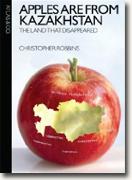Apples Are from Kazakhstan
Christopher Robbins
book reviews:
· general fiction
· chick lit/romance
· sci-fi/fantasy
· graphic novels
· nonfiction
· audio books
· author interviews
· children's books @
curledupkids.com
· DVD reviews @
curledupdvd.com
newsletter
win books
buy online
links
home
for authors
& publishers
for reviewers

 |
Apples Are from Kazakhstan: The Land that Disappeared Christopher Robbins Atlas & Co. Hardcover 304 pages April 2008 |
|
I love a good travel book. This is a genre that can include all kinds of travels – spiritual, physical, intellectual – but ultimately it is a way of taking a trip without leaving the comfort of your home, which is sometimes the only way to go. There may even be the added bonus of learning something substantive along the way. Many of the current bestselling travel books (e.g., Eat, Pray, Love and The Places in Between) provide the narrative of a personal journey as well, which can be informative and inspiring.
Through this chance meeting on an airplane with a seatmate in pursuit of his Kazakh Internet bride and the chance parting words, the author became more and more interested in investigating this mysterious country. In the intervening two years between this meeting and his visit, his interest developed into real curiosity. Apparently this was enough incentive to finally undertake a visit to Kazakhstan, which from London involves an eight-hour air trip. The romance of the place seems to overtake him. He says of his envy of his adventuresome seatmate, “He was not just traveling to an unknown country, he was making a voyage of discovery to a lost world, with its oil and gold, nomad horsemen, and golden eagles, and shiny new city in the middle of the steppe.”Beginning in about 2005, and over the course of several years, the author traveled around this vast country with several specific goals in mind, including finding for himself the birthplace of the wild apple. Along the way, Robbins provides history, anecdote, vignette, and insight into the culture and people of Kazakhstan, where, like in much of Russia, there have been two steps forward and one step back in the journey to modernization. Robbins gives readers a thorough history of Kazakhstan by connecting an anecdote or bit of history to his forays throughout Kazakhstan. For instance, within his original quest of searching for the beginning of the wild apple, he weaves history of the biology and evolution of the wild apple, the story of the great Russian geneticist Nikolai Vavilov (with first mention of Stalin and the disastrous Virgin Land Program), anecdotes about his biologist guide and ethnic Russian driver, and description of the fabulous landscape of the Tien Shan mountains outside of Almaty, former capitol of Kazakhstan - also the home of wild tulips. All of these stories are interwoven and flow easily, and not without humor. This is the pattern throughout the book. After mapping the stories, I realized that Robbins covers the history of the region from about the thirteenth century (Genghis Khan and his progeny) up to 2005, including Soviet coup and Kazakh independence. Amazingly, although the small, wonderful line drawings help to lighten this heavy load of history which is filled with sad quintessential Slavic stories, it is all so interesting. Full disclosure: I am a Russian language major (from the Soviet age) and Russian lit lover, so it was fascinating for me to hear stories from outside Russia looking back into the longtime relationship between the mother ship and the former Central Asian republic. Because they are so numerous, it is impossible to list the histories that Robbins touches on in his various visits. A short rundown of some of the highlights:
Nazarbayev has also adopted a pragmatic approach to governing the vast country with reserves of gold and oil by realizing that “the quest for the best model [of government] is still going on around the world. Here in Kazashstan I’m trying to adopt the good experiences of other countries and get rid of the bad practices of the past.”Robbins certainly gives a rosy view of Kazakh government. It should be noted that Nazarbayev has his critics, primarily as an authoritarian power-hungry leader, in spite of his overwhelming popularity within the country, and that the U.S. State Department ranked Kazakhstan as poor in upholding human rights. In the epilogue, a Kazakh friend wonders in conversation with Robbins about a book about Kazakhstan that highlights little-known and sometimes tragic stories: wild apple orchards, Aral Sea ecological disaster, nuclear testing grounds, gulags, etc. Robbins admits that this may sound odd as a premise, but as he has traveled it was the people and experiences of Kazakhstan that affected him. He sounds like a true Russian (in the larger sense) when he says that to understand what Kazakhstan has become, people must understand where it came from, reflected in his own experience of writing the book. “A country that had once been little more than a name, had become real for me, with its sad history and unlikely motley of people. Few nations can have emerged so confident and optimistic from such an unhappy past as Kazakhstan, jangling its oil dollars and looking to the future.”The beautiful descriptions and narratives leave no doubt of the beauty of this land. And now Kazakhstan it is much more than a name to me. Originally published on Curled Up With A Good Book at www.curledup.com. © Tricia Dewey, 2008 |
|
|
|
 Click here to learn more about this month's sponsor! |
|
| fiction · sf/f · comic books · nonfiction · audio newsletter · free book contest · buy books online review index · links · · authors & publishers reviewers |
|
| site by ELBO Computing Resources, Inc. | |
 In
In